Late afternoon Inle Lake, single cylinder Chinese motor, Japanese Nikon D3S, 17-35 F2.8 lens, a 15th of a second, at 14 knots
Inle lake is the final stop on the Amazing Myanmar tour, and I subscribe to the idea of “keeping the best for last”. Myanmar’s Inle lake is our crowning touch on an amazing tour of a fascinating and friendly country. We arrive in the lakeside town of Nuang Shwe and immediately board our 3 private boats, for the 45 minute journey to our comfortable, convenient and charmingly scenic, over-water accommodations, just minutes from all the best photo ops on the lake.
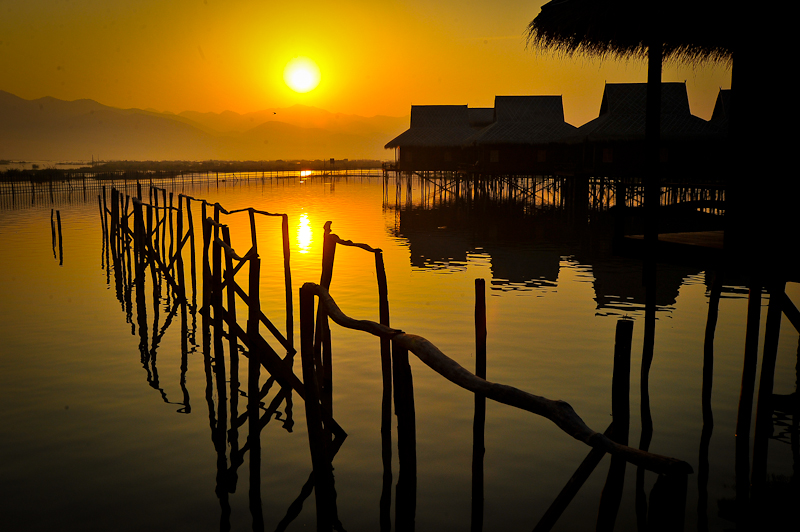 Reflection at sunrise on the hotel boardwalk on the way to breakfast.
Reflection at sunrise on the hotel boardwalk on the way to breakfast.
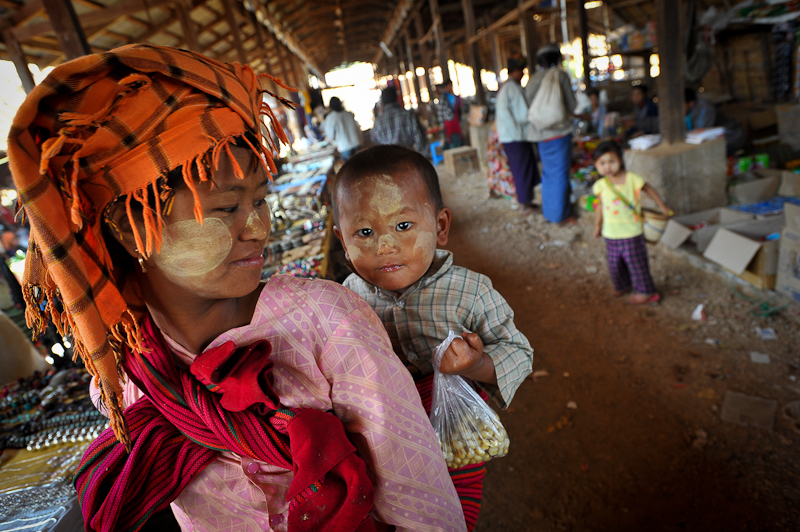 Since our accommodations are quite nearby, we were the first to arrive at the indigenous at the Inn Dein market. The markets around Inle Lake are on a 5-day rotation, and the start date of our annual photo tour is based completely upon our visit to this market, and the Napan Market which I consider to be the two best photo opportunities in this region. Located on the southwestern shore of the main lake, Inn Dein village area can be said the most scenic part of Inle Lake. The creek leading to the village is beautiful at all seasons, animating with different activities on its banks. Inn-Dein village serves as the main western portal to the lake for nearby Pa Oh villages on the hills.
Since our accommodations are quite nearby, we were the first to arrive at the indigenous at the Inn Dein market. The markets around Inle Lake are on a 5-day rotation, and the start date of our annual photo tour is based completely upon our visit to this market, and the Napan Market which I consider to be the two best photo opportunities in this region. Located on the southwestern shore of the main lake, Inn Dein village area can be said the most scenic part of Inle Lake. The creek leading to the village is beautiful at all seasons, animating with different activities on its banks. Inn-Dein village serves as the main western portal to the lake for nearby Pa Oh villages on the hills.

I noticed several of our tour participants photographing two Pa Oh women. The Pa Oh, also known as the “black Karen” are the second largest ethnic group in Myanmar’s Shan State. On market day in Inn Dein, the Pa Oh women are beautiful photo subjects because they dress in colorful head covering and beautiful blouses. Our tour participants asked these two Pa Oh women, who were selling vegetables, if if they objected to having their photos made. The women agreed, but at a price of a few thousand Kyats. I kept moving through the market, occasionally returning to the “impromptu photo shoot”. To my surprise and delight, the group stayed for more than 30 minutes, photographing the two women. One of the techniques that we talk about on this tour is to find a good subject, in good lighting conditions, and rather than take a few snaps, to stay and “work it”. The group tried all different angles and positions during the encounter. The women kept moving…laughing, giggling, and having fun, making it quite a challenge to capture the perfect shot. That evening, to my delight, I saw some stunning images of the Pa Oh women!
 Catch-lights in the eyes of a child, Inn Dein Market.
Catch-lights in the eyes of a child, Inn Dein Market.
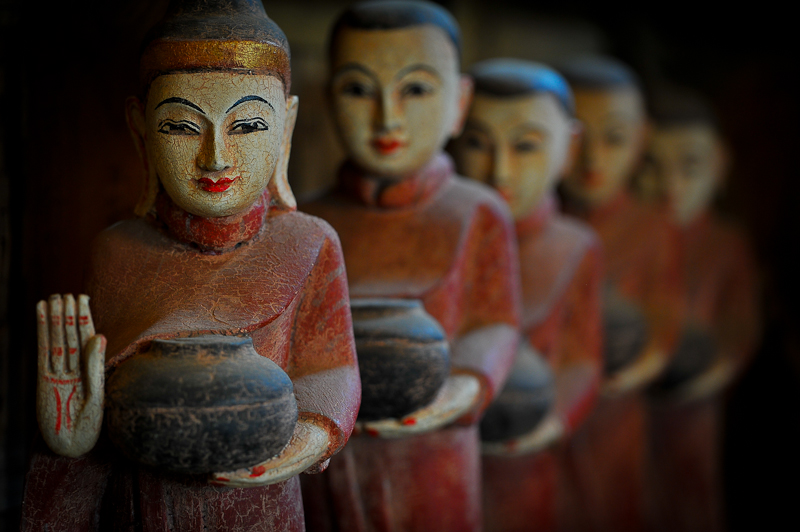 Figurines for sale at a shop at Inn Dein Market, Inle Lake
Figurines for sale at a shop at Inn Dein Market, Inle Lake
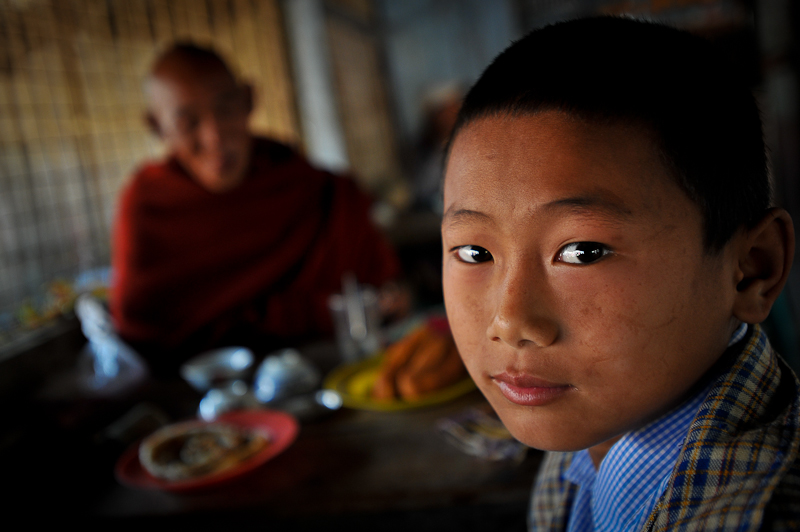 More catch-lights in a restaurant at Nampan market, Inle Lake, Myanmar
More catch-lights in a restaurant at Nampan market, Inle Lake, Myanmar
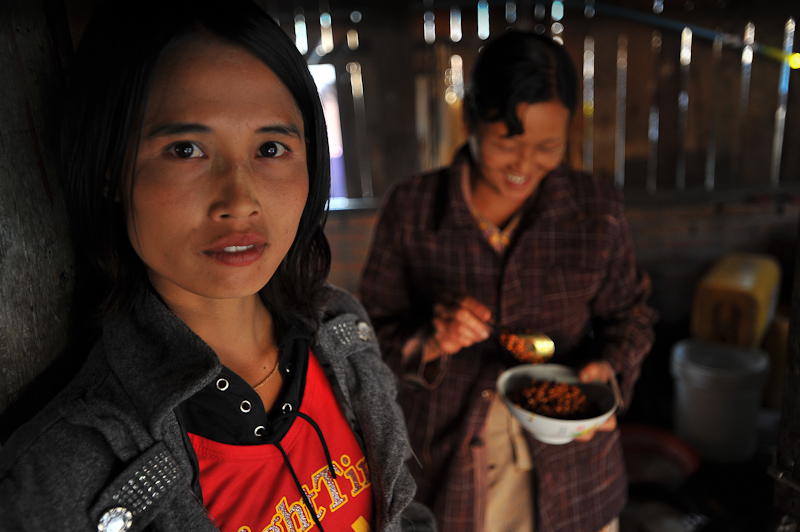 The two above and the one image below were made in a tiny local restaurant at NamPan Market. After discovering some incredible lighting conditions with back-lit smoke in the kitchen, tour participant Catherine Wisner and I spend about 30 minutes photographing the activities of the staff and customers. Including the owner and her daughter, as well as a monk who was enjoying a morning meal. By smiling a lot and sharing the photos on the backs of our cameras, we built rapport, and thus access to some very “personal” images, which we shot with 17-35mm (Nikon) and 16-35mm (Canon) lenses, “wide open” at f2.8. During the photo tour, I spend a fair amount of time teaching the technique of getting up close and personal and using an ultra-wide lens to create story telling, evocative, “environmental portraits”.
The two above and the one image below were made in a tiny local restaurant at NamPan Market. After discovering some incredible lighting conditions with back-lit smoke in the kitchen, tour participant Catherine Wisner and I spend about 30 minutes photographing the activities of the staff and customers. Including the owner and her daughter, as well as a monk who was enjoying a morning meal. By smiling a lot and sharing the photos on the backs of our cameras, we built rapport, and thus access to some very “personal” images, which we shot with 17-35mm (Nikon) and 16-35mm (Canon) lenses, “wide open” at f2.8. During the photo tour, I spend a fair amount of time teaching the technique of getting up close and personal and using an ultra-wide lens to create story telling, evocative, “environmental portraits”.
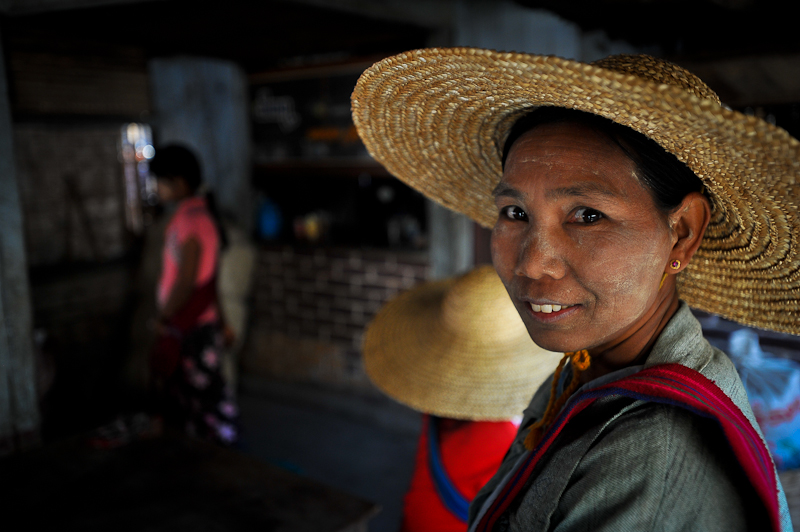
Another stop we make during our visit to Inle Lake, is to view and photograph a Cheroot Factory. The word cheroot is derived from the French word cheroute, which comes from a Tamil word meaning “roll of tobacco.” Cheroots are smoked all across Myanmar and some of the finest are produced here at Inle Lake, for distribution across the country. Cheroot production is done almost exclusively by women, who roll them by hand. A skilled worker can produce several hundred per day.
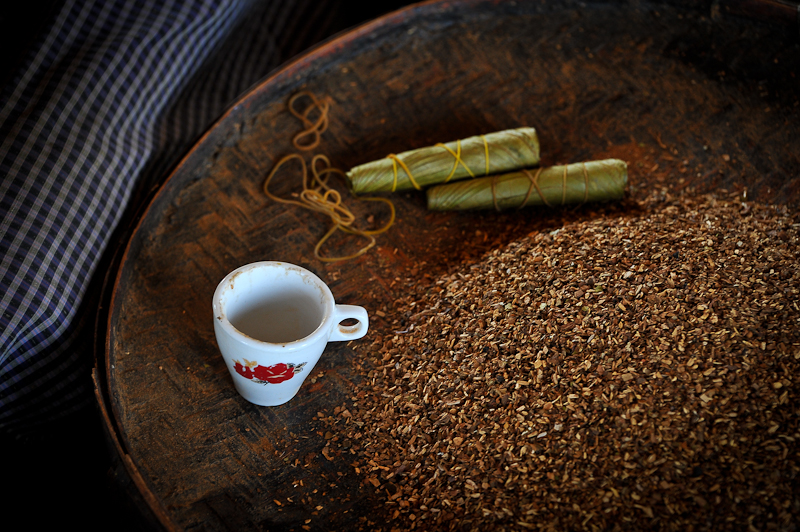 Tobacco and other combustibles ready to be rolled into “smokes” at the cheroot factory
Tobacco and other combustibles ready to be rolled into “smokes” at the cheroot factory
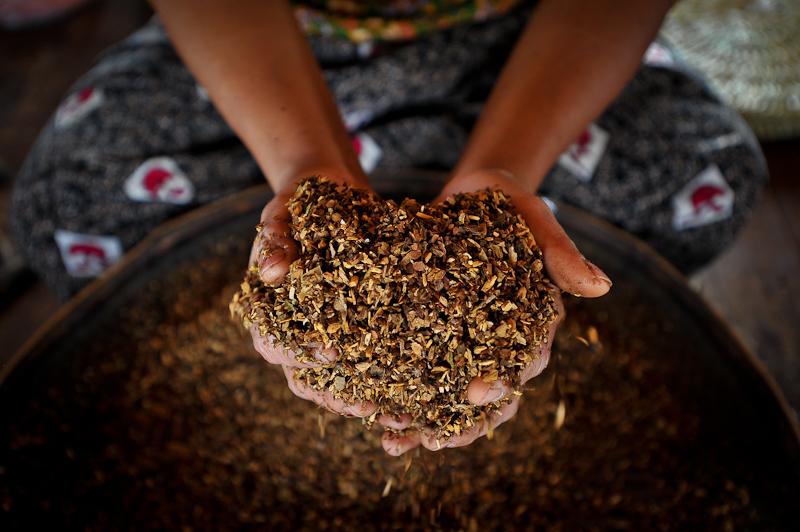
The outer skin of a cheroot is made not of paper but of the Tha-nut hpet leaves of the Sebesten tree. The filling is made of shredded tobacco leaf, and about an equal amount of chopped tobacco stalks so that the taste is not strong. According to the secret formulas of the different companies, additives of such diverse ingredients as tamarind pulp or sweet jaggery make the cheroots differ in taste. The ratio of the mild and strong leaves is also a secret of each company. There was a woman sorting Tha-nut hpet leaves in the corner of the room, on each side of her was an open window. We worked the situation, trying to find a vantage point from which to shoot, that didn’t include “hot spots”. The situation was not easy, but with a little work, the window light ultimately provided a wonderful illumination of the scene.
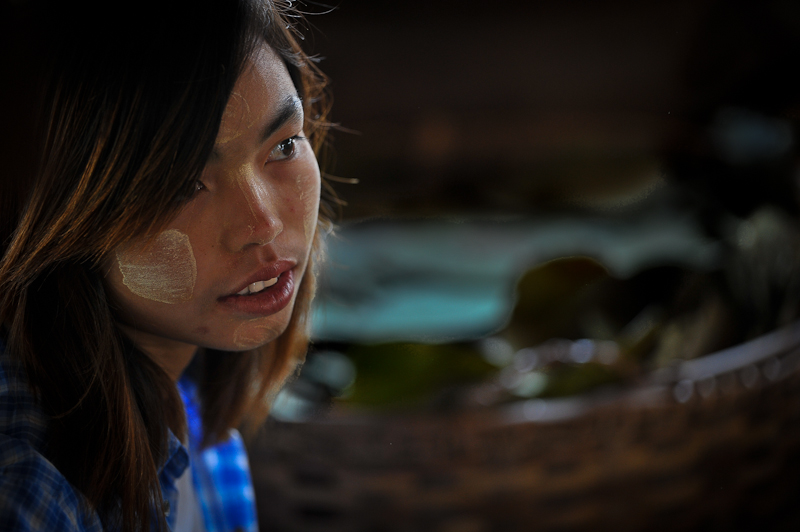 Sorting Tha-nut hpet leaves, which make up the outer shell of a typical cheroot.
Sorting Tha-nut hpet leaves, which make up the outer shell of a typical cheroot.


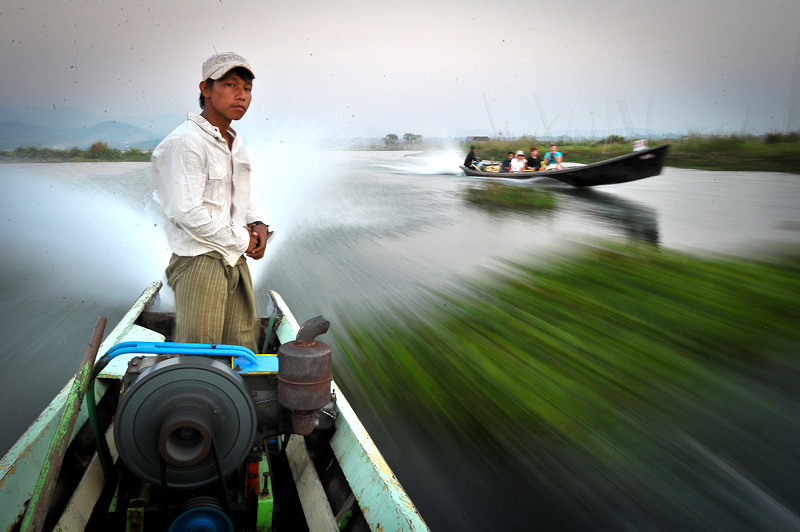
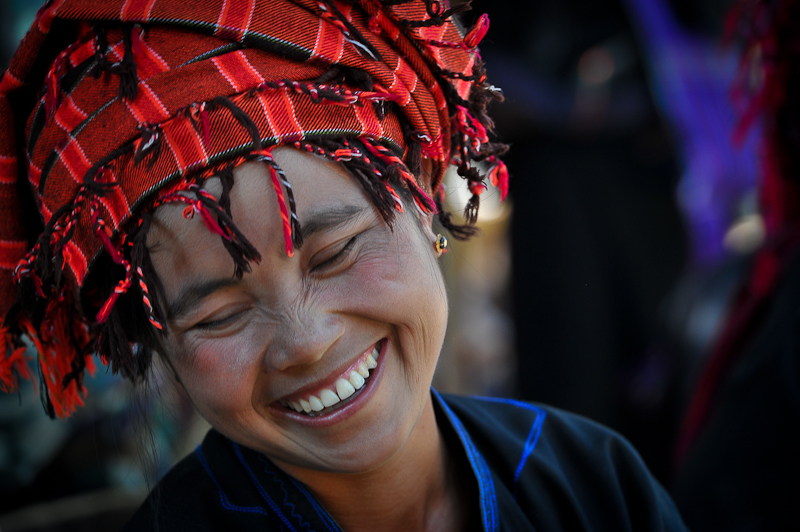
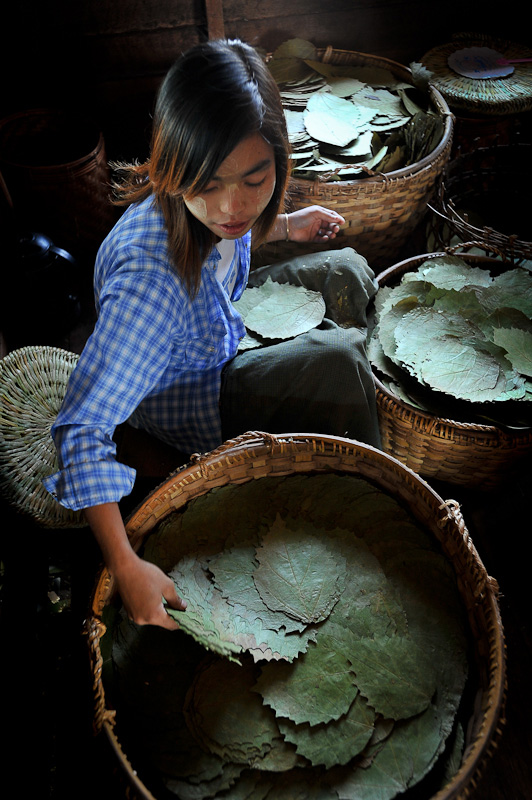






Great stuff, both the images and words! You are truly an inspiration!
Thank you Ann 🙂 I really appreciate the nice compliment!
So, so nice Karl…funny, I took photos of some of the same subjects but somehow they look nothing like yours! 😉 It was a fantastic trip.
Great work, Karl. That’s amazing how you kept it steady at a 1/15th!
Dear Karl, if someone tells a woman: «you are beautiful today», she might answer: «you mean yesterday I was not-so-beautiful». Of course you know and she knows that she has always been beautiful. To you Karl, I would like to say: «today, at the Dein market you took some beautiful photos. Please, do not answer like the woman said. Your work is great. Myanmar does seem like an amazing Country. I am now reading Paul Theroux’ book titled: Ghost train to the Eastern Star. He returns 30 years later to places he first visited. Now I am reading the chapter about the city of Pyin U Lwin in Myanmar. He describes the Country wonderfully. His words and your photographs give me the desire to travel there one day. When you are not to busy and wish to read some great travel writing, I suggest Paul Theroux. Bon voyage.
Carl V*
Hey Karl! Looks like you had another amazing trip. That last shot is great! Light, composition, textures…everything. Keep up the great work!
Fantastic, you have found an amazing place. I wanna start packing. Gary
Loved the photos Inle Lake is one of my favorite spots in Myanmar.
Pictures are fantastic! Brought back the great trip we had last Sept. with you in Myanmar.
Stunning!!
First one can win some award for sure 🙂
Rest are equally good … keep posting
Thank you for the lessons.